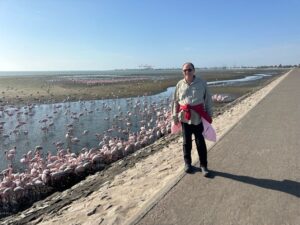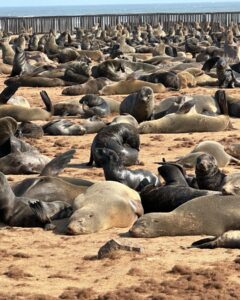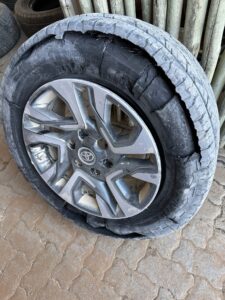The fact that I don’t suffer from allergies or post nasal drip in Namibia is not the main reason I loved Namibia.
I am returning to Namibia again this year, but not because of the pleasant 9 hour flight with an overnight stay in Addis, Ethiopia.
I generally do not eat liver and potatoes for breakfast-yet I plan to revisit Namibia again and again.
I can speak nary a word of German; yet I will return to Southern Namibia asap.
Namibia is a breathtakingly beautiful, majestic, grand, and dignified country with kind people from fascinatingly diverse cultures. That is why I will return.
1-Parking in Namibia
On the surface level, parking in Namibia is simple. There is ample space, to say the least and we found parking at every venue we ventured to within seconds, even on “Main Street”.
However, car theft in Namibia is rampant. Unlike South Africa where you can get robbed whilst waiting at a red light, the Namibians want your car, not your money or your life. There is crime in Namibia, but not violent crime. Violent crime is almost non-existent in Namibia. But car theft is rampant.
Enter the informal guard system, which I am about to describe.
Within nano seconds of parking your car, a lad appears offering (offah) a proposal: “I can take care (caya) of your car sir. No need to worry. It’s safe safe”. The lad then hovers around the car and disappears, often stepping across the street, into an alley or vanishing into thin air.
Upon returning to the car, the parking boy is there, waiting for you. “You see, safe safe”. At which point you are expected to provide between 20 and 30 Namibian dollars…75 cents to a dollar. Not including VAT, which is, lucky for all, not collected.
This is a win-win system. The car remains safe; the parking boy gets money and does only good, and the tourists and locals do not fear car theft.
I want to emphasize that anytime and everywhere you park, this system exists, except within game lodges which have guards of their own.
And in a sense, I felt that my car was much safer than in one of our own automatic parking lots with their barcodes, automatic gates and high prices.
2-Two Airports
Ben Gurion airport is full of technology that does not work. Passport machines which are supposed to scan your passport should work, but don’t. Not yet. It takes about 4-5 attempts to get it right. Then the “get out of the airport ticket” is so small, you can easily lose it-with no recourse. Staff are all busy on their telephones. Customs men are dozing at their posts, or spying for imported cell phones bought abroad. To get a taxi, you need to scan a poster to get a barcode, and people over 50 are frustrated because they don’t know how to scan. There are only 4 scanning posters. Getting a taxi takes 45 minutes.
Windhoek airport is small, quaint and cosy. “Antiquated” is a good word, unless, like me, you like things the way they used to before digitalization.
E-tickets and boarding passes must be printed out because there are no scanners.
Between the terminal and the plane, there are no buses…when you take off/land, you walk to the plane, with fire trucks or maintenance trucks often honking at the startled and jet lagged passengers.
The health regulations are not enforced; my yellow vaccine (exemption) was not checked even though I had been in Addis for 26 hours. There are 6 gates, one meter away from each other-a gate is merely a door. Staff is polite but things are slow. Very very very slow.
3-A Simpler Place in Time
In the middle of the wilderness on the way to Sandwich Bay, two tourist guides met one another going in opposite directions; they chatted in Afrikaans and in Ovambo. They pinched each others’ cheek, laughed, and parted.
At an ATM in Windhoek, a guard told me to wait until I had secured the money that I had withdrawn into my money belt before leaving the cash dispenser.
A waitress in Uis explained to me which tribes in Uis intermarry and which don’t; well, almost don’t. And a white Namibian explains to me why Namibia and South Africa are so different.
A bartender and I joke when I order a non alcoholic Windhoek 0 beer after I tell him I am too young to drink.
I ran out of money to tip someone who had served us supper. I left the restaurant and changed a 50 Euro note and returned to give her a tip, 20 minutes later. She was so embarrassed-and thanked me profusely.
All of the above interactions have one thing in common: all the people were gentle. Soft voices, calm demeanor, and a silky softness. That’s my impression of Namibians-rich and poor; black and white; north and south. Kind gentle people.
Which is not true of the country’s landscapes. The country is rugged, wild and hard to navigate, with sizzling hot days and frozen nights, brutal roads and god-forsaken towns, such as Rietoog.
My impression of the gentleness of the Namibians serves them well. They are kind to one another, kind to tourists and are uninvolved in world affairs. As Gladys Knight sang, “a simpler place in time”
4-Signing your name and feeding the bureaucratic beast
And it came to pass that in the middle of nowhere, or perhaps beyond, we heard a noise that indicated that we had a flat tire. Which proved wrong. We had a decimated tire. Enter exhibit A.
Since there was no signal on our mobile phones and no internet, we tried ourselves to change the tyre which proved to be quite a challenge. The spare was attached to the bottom of the car; it proved impossible to release. Nor could we unscrew the bolts from the tyre.
Half an hour later, 3 Frenchmen drove by. My French proved very useful in enlisting their help. However, one hours’ work only managed to loosen two bolts. Add another hour, and two Namibians stop to help us. Like Canadians who shovel snow from birth, or Singaporeans who can run in the heat, Namibians know how to change tires since flats happen as a matter of course.
One hour later, we were on our way with generous gifts having been bestowed on Namibian and French alike.
When we finally got a phone signal two hours later, the rental company said that we should get the spare replaced at xxxxxx? “What did you say, can you spell that?”
Get the tire changed at Sesrium. “Where”? Near Soussevlei? “What did you say, Sesrim or Soussassomethingorother?”
5 hours later, we arrived at the tire shop.
A call was made by the tire shop to Windhoek and they agreed to pay for a replaced tire. We were asked to sign an authorization form.
Then, a spare tire was chosen. A second call was placed to Windhoek and the spare tire was approved. We were asked to sign a second form of agreement to accept the new tire.
Work was completed, and we were asked to sign a third form-oking that the work had been completed with our approval.
Shit happens but people can have kind hearts when faced with difficult situations, and signing your name to feed the bureaucratic beast is just minor collateral damage.
5-Filling up with petrol in Namibia
To the extent that you think a visit to the petrol station is a 3 minute affair, a visit to Namibia will open your eyes to new vistas.
All drivers regardless of ethnicity or type of car are beckoned to come enter all the various pumps… all at once. Each pump has “wavers” doing elaborate and exaggerated motions apparently to make you feel welcome. The wavers will have a story unto themselves.
Each pump has 2 or 3 boys or girls who fill up the tank to the very very very very very top…nary a gram remains for more petrol. This process of topping up can take up to ten minutes because of various conversations going on. Windows are scrubbed two to ten times, often by several people.
When the tank is full… someone will accompany you inside to pay.
The line to pay can be very long or longer. Often up to 20 minutes. Subsequently someone else escorts you to your car.
The many attendants get 10 to 20 Namibia dollars each, or a bottle of water.
If you don’t have change, all you do is explain that you don’t have change.
I always had change.
Often the people at the pump will speak to you in perfect English with a German accent… Which i found very interesting.
I always struck up a conversation and cracked jokes…. Which caused laughter but no increase in the amount of time invested.
Petrol stations are few and far between so we wisely stopped at all stations we saw.
Almost all stations have tyre repair service, thank heavens as we were to learn. But that’s another story.
And visiting Namibia also entails learning and learning to love a labour intensive country.








Great story – sounds like a wonderful trip. I know Namibia as a place that ex-pats like to settle – at least for an extended time. Several of the Comverse folks ended up there for a while and they could have afforded to go anywhere they wanted but chose Namibia.
Thanks chief…and who knows where I will end up.
Next to one of our hotels in Walvis Bay was the Koby Alexander Industrial Park.
Wonderful narrative for a country I have long been wanting to visit! Did the petrol attendants shake your car so that they could get a bit more petrol into your tank? This is a common practice in South Africa where filling to the brim is a matter of course!
Nope.. They didn’t ask.
Did it straight away